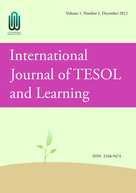


Volume 11 Issues 1-4 (2022-12-31)
Volume 10 Issues 3&4 (2021-12-31)
Volume 10 Issues 1&2 (2021-06-30)
Volume 9 Issues 3&4 (2020-12-31)
Volume 9 Issues 1&2 (2020-06-30)
Volume 7 Issues 3&4 (2018-12-31)
Volume 6 Issues 3&4 (2017-12-31)
Volume 6 Issues 1&2 (2017-06-30)
Volume 5 Issues 1&2 (2016-06-30)
Using both quantitative and qualitative research approaches, this study investigated the effectiveness of peer feedback in the EFL writing classrooms from the perspectives of the peer feedback receivers and their English writing teachers. The participants included nine college students as peer feedback givers, six college students as peer feedback receivers, and three experienced college English teachers as teacher feedback givers. Using generalizability theory as a quantitative framework, this study first investigated the six feedback receivers’ quantitative evaluation of peer in contrast to teacher feedback; it then examined the teacher feedback givers’ quantitative evaluation of peer feedback. Further, it investigated the six feedback receivers’ qualitative evaluation of peer in contrast to teacher feedback. Finally, it examined the perceptions of both the feedback receivers and teacher feedback givers about the effectiveness of peer feedback in the EFL writing classrooms. The results indicated that the feedback receivers generally perceived their peers’ feedback as effective and helpful for them to improve their English essays. Further, the teacher feedback givers held positive views about the effectiveness of peer feedback and would be willing to incorporate peer feedback activities in their EFL writing classrooms. Implications for peer feedback receivers and their college English teachers are discussed.
Across the globe, from the very wealthy continents of North America to Europe to Australia, the phenomenon of migrant and immigrant students outperforming native students are observed and documented. Even within the same race, achievement differences are being observed. What might account for the achievement success of one group of students over the other group? Are achievement differences among the migrant and non-migrant groups linked to only family dynamics or to socio-cultural or to psychological factors? Ogbu’s (1998) Cultural-Ecological Model appears to be insufficient in completely and effectively accounting for these achievement differences. Therefore, the author is proposing a more comprehensive, “Interdisciplinary Theoretical Model of Migrant Schooling” to effectively account for the achievement differences seen across the globe.
This quantitative study examined Chinese college students’ use of reading and test-taking strategies in the college English reading comprehension test. Specifically, it first explored the gender, major, and gender-by-major effects on their use of reading and test-taking strategies; it then investigated the relationship between their reading comprehension performance and use of reading and test-taking strategies, respectively. A total of 165 Chinese freshmen students were invited to complete a reading comprehension test and a strategy survey. Using SPSS, descriptive statistics, ANOVAs, Pearson correlations, and multiple linear regression analysis were performed. Both significant differences and relationships were found. Implications for Chinese college English teachers and English reading course developers are discussed.